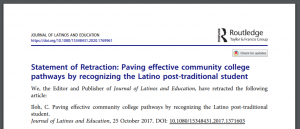A neuroscientist who studies alcohol and stress faked data in two published studies and two grant applications submitted to the National Institutes of Health (NIH), according to a U.S. government watchdog.
Lara S. Hwa, an assistant professor of neuroscience at Baylor University in Waco, Texas, since January 2021, “engaged in research misconduct by knowingly or recklessly falsifying and/or fabricating data, methods, results, and conclusions in animal models of alcohol use disorders,” the U.S. Office of Research Integrity (ORI) concluded in its findings.
ORI found Hwa, who has not immediately responded to our request for comment, “falsified and/or fabricated experimental timelines, group conditions, sex of animal subjects, mouse strains, and behavioral response data” in the grant applications and papers. The articles were published when she was a postdoc at the Bowles Center for Alcohol Studies at the University of North Carolina School of Medicine in Chapel Hill.
Continue reading Alcohol researcher faked data in animal studies, US watchdog says








